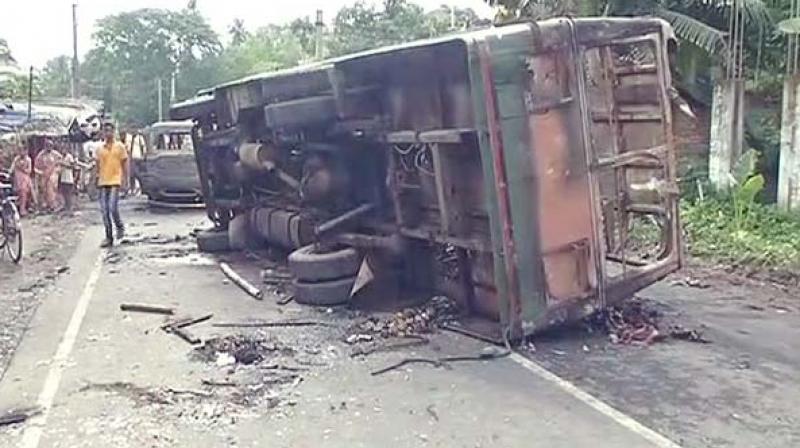Waiting Game: W. Bengal pays price as Didi plays Muslim card
Ms Banerjee's wooing of the Muslim vote is legitimate but her methods have been clumsy and dangerous.

Successive rounds of religious violence have broken out in West Bengal’s North 24 Parganas district, in areas very close to the border with Bangladesh. The provocation appears to have been an offensive Facebook post put up by a Hindu student. This writer has not seen the post and cannot comment on its contents. Yet, the organised riots that followed the uploading of the post, however distasteful it may have been, suggest something more than a spontaneous and outraged response by ordinary, God-fearing Muslims. Mobs spread out, burnt down buildings, damaged public property and targeted Hindu houses. This led to a flight of Hindus from mixed-population neighbourhoods. There was a Hindu counter-mobilisation, followed by a Muslim response to that as well. The unfortunate cycle continues and is spreading in its geographical expanse. Three days ago, an aged man, a Hindu as it happened, was stabbed and killed in Basirhat town, while on his way home. What is telling in this entire episode is the reaction of the Trinamul Congress government. Its spokespersons increasingly resemble the information minister of Saddam Hussein’s regime, Muhammad Saeed al-Sahhaf, who was confidently predicting victory even as American troops had reached Baghdad airport in the summer of 2003. “Comical Ali”, as the information minister was nicknamed, was living in a world of his own. He was believed only by media outlets and newspapers who were so beholden to Saddam Hussein or so in thrall of him that they dared not look truth in the eye.
The Trinamul ecosystem in West Bengal is giving Comical Ali a run for his money. This ecosystem includes the party’s propaganda machinery in Kolkata, its occasional ambassadors in Delhi, as well a section of the media in West Bengal. This section has swung from foretelling a defeat for Mamata Banerjee in the 2016 Assembly election to prostrating itself before her government and its wild conspiracy theories. No detailed reportage is forthcoming about an outbreak of violence in the very backyard of such media groups. Anyway, that should not detain us here. What is at the root of the disturbances in North 24 Parganas? The origins go back to a decisive push for illegal migration and demographic change in border towns and villages that began under the CPI(M) and has been further encouraged, in more striking terms and with greater cynicism, by the Trinamul. This has caused population shifts and led to significant numbers of Bangladeshi Muslims being allowed to settle in what used to be Hindu neighbourhoods. With political support, these groups have become influential and in some sub-regions dominant.
The Trinamul’s mobilisation of Muslim votes across West Bengal has been very effective. It was so in 2011, when the party won the Assembly election for the first time, and has intensified in the past six years. It has successfully combined Bengali-speaking and Urdu-speaking Muslims — two distinct cohorts, earlier divided between the CPI(M) and the Congress — and created a Muslim qua Muslim voter constituency that is unparalleled in Bengal since the 1940s. This is the hard fact. Ms Banerjee’s wooing of the Muslim vote is legitimate, but her methods have been clumsy and dangerous. She has brought in the religious angle when this was unnecessary. For example, in 2016, the Pakistani ghazal maestro Ghulam Ali was scheduled to sing at a privately-organised event in Mumbai. Thanks to threats by the Shiv Sena, the concert was cancelled. It was unfair bullying, and there is little doubt that the Sena was acting thuggishly. The Trinamul government then invited Ali to perform in Kolkata, and promised the necessary security. As a political statement, this was perfectly fine. Even so, it was not the West Bengal government’s department of culture that hosted Ali. The ghazal artiste was the guest of the department of minorities. His concert arrangements were paid for using budget allocated for minority communities’ welfare, education and so on. Other examples of Trinamul egregiousness have been more trenchant. A cadre of controversial Muslim politicians, nominally affiliated to the Trinamul, has virtually hijacked community politics. Some of them have transnational Islamist affiliations, including with the Jamaat in Bangladesh and its kindred organisations in India.
These are men like Idris Ali (MP from Basirhat), Siddiqullah Chowdhury (a minister as well as state unit chief of the Jamiat Ulema-e-Hind) and Shaikh Nurul Islam (former MP from Basirhat and implicated in the Deganga riots of 2010). In certain parts of West Bengal, such as in North 24 Parganas, the Trinamul has ceded political authority to these vote managers. The state has lost its nerve. The police has been reduced to passivity or to tacitly supporting mobs of a radical religious character. Take the case of Dipendu Biswas, former footballer and current MLA from Basirhat. He had lost a byelection to the BJP in 2014, but won the Assembly election in 2016. In the past few days, he has been held hostage by forces loyal to the Jamaat and related groups. He has acquiesced in a targeting of Hindu neighbourhoods by the police and this has created a disquiet among many who voted for him in 2016. Frankly, he is powerless. In many respects, so is his chief minister. A backlash is gradually building. Ms Banerjee’s crude Muslim mobilisation has caused misgivings in middle-class Kolkata, in smaller towns and rural areas in south and central Bengal, and even among sections of Bengali-speaking Muslims who look upon this new rendition of religious identity and politics as an imported imposition, alien to their culture. It is not as if these voter groups are suddenly and overwhelmingly going to vote for the BJP. That is not the point at all. The point really is that the Trinamul and its leadership have unleashed toxic forces they can no longer curb. West Bengal is paying the price.

